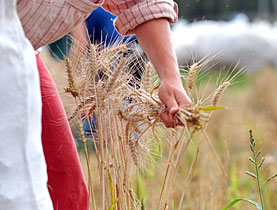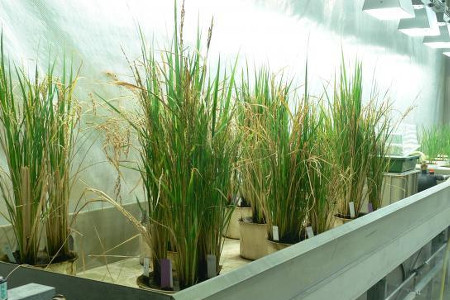Swiss tire of biotech debate

Despite its sometimes controversial reputation, green biotechnology is failing to arouse great interest in Switzerland.
According to a new study, stakeholders are tired of the topic, the media is not reporting on it and the public is ambivalent.
And most people welcome the government’s proposal to extend the current moratorium on the commercial use of genetically-modified (GM) plants.
The “Green Technology in the Public Sphere” project, whose results were revealed in Zurich on Friday, looked into attitudes towards green biotechnology among the stakeholders – such as scientists, the agro industry and non-governmental organisations – the media and the public.
It is part of the government-backed National Research Programme NRP 59, which is investigating the benefits and the risks of GM plants from a wide-ranging scientific perspective.
Swiss voters accepted a five-year moratorium on the commercial use of GM plants in 2005, giving Switzerland some of the toughest legislation in Europe. The sowing of genetically modified seeds is, however, allowed under strict controls for research purposes.
In July this year the government announced that it wanted to extend the moratorium, which runs out in 2010, for three years to have more time to look into scientific and legal issues. This still has to be considered by parliament.
A bit tired
“The stakeholders are a bit tired [of the debate], most of them told us that the current moratorium is not bad,” said study leader Heinz Bonfadelli, of the Institute of Mass Communication and Media Research at Zurich University.
“The government is discussing prolonging the moratorium and this is the dominant opinion among the stakeholders as well,” he told swissinfo.ch.
The study found that there was hardly any market, products or field testing in Switzerland. Furthermore, the stakeholders considered that all arguments had been aired and welcomed the “lull in fighting” between those for and against GM.
As for the media, interest fell after the moratorium was decided. Current reports are mostly driven by the political agenda, although the science side did get some exposure. Tabloid-style newspapers tended to focus on health risks. A recent story highlighted a government investigation into whether GM linseed had found its way into Swiss food.
Ambivalence reigns
What was striking about the public part of the study, which surveyed more than 1,000 people, was that attitudes had hardly changed in the six years included in the research and that ambivalence reigned.
Currently, one third of the population is against biotech in agriculture or food and one third is in favour, leaving a strong group of undecided, Bonfadelli said.
“Our research showed us that when people read the words genetic engineering or biotechnology and they see applications in medicine or genetic testing, most people are in favour, as they see positive evaluated future possibilities,” the academic explained.
“But when it comes to applications in agriculture or food, they see risks, or they have problems with future-oriented topics like a decrease in biodiversity. This probably a bit explains these ambivalent attitudes.”
Men were generally more in favour of GM and acceptance rose along with levels of education.
Only around 15 per cent of those surveyed said that biotech was a burning issue for them.
Communication
However, the Swiss population are still better informed than some stakeholders think, argued Bonfadelli. The Swiss perform well in European comparisons, which is due to the political discussions surrounding the moratorium and other GM issues.
In all, 60 per cent of the people asked were in favour of prolonging the moratorium and only 25 per cent said it should be stopped.
Bonfadelli said that, nevertheless, an active public debate on green biotechnology was needed in Switzerland.
“There is not much communication in the media and by the stakeholders. We still need much more active dialogue among scientists, stakeholders, the NGOs and schools,” he said.
“Nobody can afford to wait for other people to do the communication job in this field.”
Isobel Leybold-Johnson in Zurich, swissinfo.ch
The government requested that the Swiss National Science Foundation implement the National Research Programme NRP 59 “Benefits and Risks of the Deliberate Release of Genetically Modified Plants” to help answer some of the questions surrounding the GM issue.
The programme is neither in favour of nor against the use of GM plants. It contributes answers to the questions politicians and society have raised about this new technology.
In July this year, the government announced that it would like to extend the moratorium “for GMO-free agriculture”, which is due to run out on 27 November, 2010, by three years. In its session of 1 July 2009, it passed the dispatch on an amendment to the Gene Technology Act to parliament.
The study conducted a survey of the best-known stakeholders to identify the most important players and analyze the links between them, as well as their arguments.
6 major Swiss newspapers were reviewed (3 French-speaking, 3 German-speaking) between January 2003 and June 2008 and 13 journalists interviewed.
Around 1,058 people were selected as a representative sample from German and French-speaking Switzerland to find out their opinions in spring 2009. 21 people were interviewed in more depth.
At the conference on September 18 announcing the results, a few scientists took issue with the study’s conclusion that some scientists thought the public was not well informed. A stakeholder said that not all were tired of the debate.

In compliance with the JTI standards
More: SWI swissinfo.ch certified by the Journalism Trust Initiative






You can find an overview of ongoing debates with our journalists here. Please join us!
If you want to start a conversation about a topic raised in this article or want to report factual errors, email us at english@swissinfo.ch.